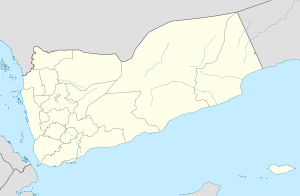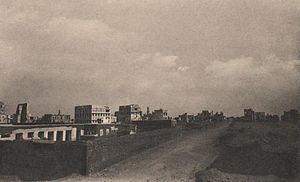Mocha, Yemen
| Mocha | |
|---|---|
| Location in Yemen | |
| Coordinates: Lua error in package.lua at line 80: module 'strict' not found. | |
| Country | |
| Governorate | Taiz Governorate |
| 16,794 | |
| Time zone | Yemen Standard Time (UTC+3) |
Mocha or Mokha (Arabic: المخا al-Mukhā Yemeni pronunciation: [elˈmoχæ]) is a port city on the Red Sea coast of Yemen. Until Aden and Hodeida eclipsed it in the 19th century, Mocha was the principal port for Yemen's capital Sana'a.
Contents
Overview
Mocha is famous for being the major marketplace for coffee from the 15th century until the early 18th century. Even after other sources of coffee were found, Mocha beans (also called Sanani or Mocha Sanani beans, meaning from Sana'a) continued to be prized for their distinctive flavor—and remain so even today.[1]
According to the Portuguese Jesuit missionary Jerónimo Lobo, who sailed the Red Sea in 1625, Mocha was "formerly of limited reputation and trade" but since "the Turkish assumption of power throughout Arabia, it has become the major city of the territory under Turkish domination, even though it is not the Pasha's place of residence, which is two days' journey inland in the city of Sana'a."[2] Lobo adds that its importance as a port was also due to the Ottoman law that required all ships entering the Red Sea to put in at Mocha and pay duty on their cargoes.
Passing through Mocha in 1752 and 1756, Remedius Prutky found that it boasted a "lodging-house of the Prophet Muhammad, which was like a huge tenement block laid out in many hundred separate cells where accommodation was rented to all strangers without discrimination of race or religion." He also found a number of European ships in the harbor: three French, four English, two Dutch, and one Portuguese.[3]
English, Dutch, French and Danish East India companies maintained factories at Mocha, which remained a major emporium and coffee exporting port until the early 19th century. In August 1800 Phoenix visited. William Moffat, her captain, took the opportunity to prepare a chart of the mouth of the Red Sea.
In December 1820, HMS Topaze and ships and troops belonging to the British East India Company attacked the North and South Forts, destroying them. The action was in pursuit of British demands on the government of the city. However, by that time, Mocha's trade in its country's precious commodity of coffee grains (Coffea arabica) had already been supplanted by Ethiopia who was the principal trader of this commodity to North Africa and which sold for a third of the price of the same coffee imported from Arabia.[4] The destruction of the city was still prominent as late as 1909, when German explorer and photographer, Hermann Burchardt, wrote of the city Mocha as he saw it: “This card will reach you from one of the most godforsaken little places in Asia. It exceeds all my expectations, with regard to the destruction. It looks like a city entirely destroyed by earthquakes, etc.”[5]
Diplomat Edmund Roberts visited Mocha in the 1830s. He noted that Turkish "rebels" possessed Mocha. The Turks took it over after they left Egypt while being disgruntled with the rule of Muhammad Ali of Egypt. The "rebels" consisted of a leader, Turkie ben al Mas, and people from throughout Arabia.[6]
Mocha was among the population centers in southern Yemen taken over by the Houthis during their military offensive in March 2015.[7]
At present, Mocha is no longer utilized as a major trade route and the current local economy is largely based upon fishing and small amounts of tourism. The village of Mocha was officially relocated 3 kilometres (1.9 mi) west along the Red Sea shore to accommodate the building and demolition of several coastal highways.
Climate
Köppen-Geiger climate classification system classifies its climate as hot desert (BWh).
| Climate data for Mocha | |||||||||||||
|---|---|---|---|---|---|---|---|---|---|---|---|---|---|
| Month | Jan | Feb | Mar | Apr | May | Jun | Jul | Aug | Sep | Oct | Nov | Dec | Year |
| Average high °C (°F) | 31.2 (88.2) |
31.5 (88.7) |
33.4 (92.1) |
35.4 (95.7) |
37.6 (99.7) |
38.8 (101.8) |
39.5 (103.1) |
38.9 (102) |
37.6 (99.7) |
35.7 (96.3) |
33.2 (91.8) |
31.4 (88.5) |
35.35 (95.63) |
| Daily mean °C (°F) | 26.7 (80.1) |
27.1 (80.8) |
28.8 (83.8) |
30.6 (87.1) |
32.7 (90.9) |
34 (93) |
34.6 (94.3) |
34 (93) |
33 (91) |
31 (88) |
28.9 (84) |
27.2 (81) |
30.72 (87.25) |
| Average low °C (°F) | 22.3 (72.1) |
22.7 (72.9) |
24.2 (75.6) |
25.9 (78.6) |
27.8 (82) |
29.2 (84.6) |
29.7 (85.5) |
29.1 (84.4) |
28.4 (83.1) |
26.3 (79.3) |
24 (75) |
23 (73) |
26.05 (78.84) |
| Average precipitation mm (inches) | 5 (0.2) |
2 (0.08) |
4 (0.16) |
4 (0.16) |
2 (0.08) |
1 (0.04) |
8 (0.31) |
14 (0.55) |
22 (0.87) |
6 (0.24) |
2 (0.08) |
5 (0.2) |
75 (2.97) |
| Source: Climate-Data.org, altitude: 3m[8] | |||||||||||||
Sister cities
 Tadjoura, Djibouti
Tadjoura, Djibouti
See also
References
- ↑ Lua error in package.lua at line 80: module 'strict' not found.
- ↑ Donald M. Lockhart, translator, The Itinerário of Jerónimo Lobo (London: Hakluyt Society, 1984), p.88
- ↑ J.H. Arrowsmith-Brown, translator and editor, Prutky's Travels to Ethiopia and Other Countries (London: Hakluyt Society, 1991), pp.363f
- ↑ Johann Ludwig Burckhardt (John Lewis Burckhardt), Travels in Nubia 1819.
- ↑ Michael Friedländer, Hermann Burchardt: Mitteilungen aus seinen letzten Briefen (Messages from his last letters), published in Journal: Ost und West (Illustrated monthly magazine for all of Judaism), issue 2 / February 1910, Berlin, p. 108 (German).
- ↑ Lua error in package.lua at line 80: module 'strict' not found.
- ↑ Lua error in package.lua at line 80: module 'strict' not found.
- ↑ Lua error in package.lua at line 80: module 'strict' not found.
Further reading
- Published in the 19th century
- Lua error in package.lua at line 80: module 'strict' not found.
- Lua error in package.lua at line 80: module 'strict' not found.
- Lua error in package.lua at line 80: module 'strict' not found.
- Lua error in package.lua at line 80: module 'strict' not found.
- Published in the 20th century
 Lua error in package.lua at line 80: module 'strict' not found.
Lua error in package.lua at line 80: module 'strict' not found. Lua error in package.lua at line 80: module 'strict' not found.
Lua error in package.lua at line 80: module 'strict' not found.
External links
| Wikimedia Commons has media related to Mocha. |
Lua error in package.lua at line 80: module 'strict' not found.
- Articles containing Arabic-language text
- Wikipedia articles incorporating a citation from the 1911 Encyclopaedia Britannica with Wikisource reference
- Wikipedia articles incorporating citation to the NSRW
- Wikipedia articles incorporating citation to the NSRW with an wstitle parameter
- Commons category link is locally defined
- Populated places in Taiz Governorate
- Port cities and towns of the Red Sea
- World Digital Library related



